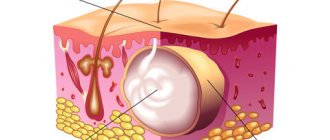Many people are familiar with the unpleasant manifestations of herpes. This is not surprising, because according to WHO, more than 78% of the world's population is infected with the most common types of the virus: 67% are infected with herpes simplex virus type 1, and another 11% with herpes simplex virus type 2.
What is herpes, what causes it, why is it dangerous, and how should it be treated? Having knowledge about the disease, you can minimize the risk of its exacerbation, and most importantly, avoid complications.
Herpes on the lips
Herpes is a virus
The source of the disease is the so-called herpes viruses. These are DNA-containing microorganisms that are causative agents of various types of infections.
The initial entry of the virus into the body usually occurs through the mucous membranes (although entry through damaged skin is not excluded). Having overcome tissue barriers, harmful microorganisms enter the blood and lymph and spread throughout the body. They are able to penetrate the cells of internal organs and nerve endings. The peculiarity and danger of herpes is that it is genetically introduced into the nucleus of nerve cells, after which it remains in the body forever.
Many people do not even realize that they are carriers of the virus, since the pathology in most cases is asymptomatic, not showing itself in any way (this is called a latent state).
The human immune system is capable of suppressing the development of the virus, but if it is weakened, the infection “awakens.”
Herpes Virus
The danger of chickenpox for a pregnant woman and fetus
If the disease is detected in a pregnant woman, the symptoms leave no doubt about the nature of the pathology, and she is usually hospitalized. In the early stages, it is fraught with severe consequences for the fetus:
- underdevelopment of the limbs;
- skeletal abnormalities;
- defects of the visual apparatus;
- damage to the skin;
- lesions of the central nervous system;
- developmental delay.
If the infection occurred in the third trimester, the disease will appear in the baby immediately after birth. Within a week, symptoms caused by herpes viruses will appear. The course of the disease is extremely severe - in a third of diagnosed cases the child does not survive
Symptoms of different types of herpes
A “sleeping” virus may not bother its host for years. But if for some reason the virus enters the active phase, it is easy to recognize - by its characteristic rashes. The “classic” visual sign of herpes is itchy, watery blisters that can appear in different places - on the face and on the body.
There are several types of herpes virus - they differ in their manifestations. Most often in medical practice, diagnoses such as HSV-1 and HSV-2 are encountered - this is the abbreviated name for herpes simplex viruses types 1 and 2.
Cold sores and chicken pox are related diseases caused by herpes. Several types of the virus can “coexist” in one person.
| Many people call this pathology a “cold on the lips,” although the “classic” cold and herpes are different things. We are talking about the herpes simplex virus type 1, which usually “attacks” the lips and nasolabial triangle. Externally, the disease manifests itself in the form of rashes. They represent one or a whole cluster of bubbles with liquid contents. When asked whether there can be a fever with herpes, the answer is positive: many patients complain of fever, headaches and general weakness. Among doctors, there is another name for pathology: when you see a diagnosis such as oral or labial herpes in your medical record, know that we are talking about the herpes simplex virus type 1. Herpes on the lip is usually very itchy |
| The second type of herpes simplex is accompanied by the development of genital (genital) infections. The disease in most cases is asymptomatic or, as with labial herpes, is accompanied by the appearance of blisters (ulcers), but only in the area of the external genitalia. Other signs of HSV-2 are fever, body aches, fatigue, and swollen lymph nodes in the genitals. Most often, the disease is transmitted sexually, but infection can also occur from a person with labial herpes. |
| Virus type 3, also known as the herpes zoster virus, is the culprit of chickenpox. To become infected, it is enough to enter into a conversation with a sick person (transmission occurs through airborne droplets). Having had chickenpox, a person remains a carrier of this virus for the rest of his life. In case of relapse, there is a risk of developing herpes zoster. This disease is characterized by the appearance of itchy rashes throughout the body, as well as fever. Chicken pox |
| Herpes type 4 causes such a serious infectious disease as mononucleosis. This disease is accompanied by enlarged lymph nodes and fever; the patient complains of a sore throat and general weakness. The liver and spleen are also affected. |
| Herpes type 5 provokes the development of cytomegalovirus. The disease manifests itself differently, depending on which organ is affected. A runny nose, disturbances in the gastrointestinal tract, inflammatory diseases of the genital organs - all this can be a sign of pathology. |
| In addition to those described above, there are also types 6, 7 and 8 herpes. Scientists are now studying these viruses. |
What is chickenpox pneumonia
Chicken pox can cause a serious complication - pneumonia. As a rule, generalized lung disease is diagnosed in adults. The pathology develops quickly, the first signs of pulmonary failure often appear simultaneously with the rash. It appears as follows:
- shortness of breath, feeling of lack of air when inhaling;
- chest pain;
- cough with sputum;
- bluishness of the skin.
Many focal nodules are visible on radiographic images. Viral pneumonia is a rare but very serious complication. It mainly occurs in patients with immunodeficiency conditions and chronic lung diseases.
The risk of complications of an infectious disease is high during pregnancy. Chickenpox can also be worsened by the development of bacterial pneumonia. Pneumonia is caused by pathogenic bacteria that have invaded a weakened body.
Herpes - what causes it?
The risk of contracting an infection arises from a very early age, because there are a huge number of adults around a small child, most of whom are carriers of herpes. Infection can also occur in the womb of an infected mother.
So, what can cause herpes on the lips? Children (and adults) often become infected through kissing, as well as through sharing utensils. If you are near a person with herpes who coughs or sneezes, there is a high risk of infection through airborne droplets. In addition, the virus is transmitted sexually (primarily this concerns HSV-2). People who receive blood transfusions are also at risk.
Fortunately, most people infected with the herpes virus (about 80%) have an inactive form of the infection. However, there are factors that provoke a relapse - then the “sleeping” virus begins to actively multiply. So, some people regularly suffer from sores on their lips - the hated “cold” can appear 5-10 times a year. The cause of recurrence of the disease may be:
- diseases – endocrine, viral and bacterial;
- hypothermia;
- stress;
- exhaustion of the body;
- overwork;
- injuries;
- metabolic disorders.
In women, another provoking factor is menstruation.
Is there any prevention against herpes?
To resist the virus, you need a strong immune system. Therefore, those who suffer from frequent colds on the lips need to pay attention to their immune system. Take care of a healthy, balanced diet, do not forget about sports, maintain a normal daily schedule (first of all, ensure that you get adequate sleep) and try to get rid of bad habits (smoking, etc.).
It is important to practice basic hygiene, including regular hand washing. It is recommended to use personal hygiene products. During infectious epidemics, it is advisable to avoid staying in crowded places if possible.
To reduce the risk of genital herpes, you should use condoms.
How to find out if there is a virus?
Already during the initial examination of the patient, the doctor can determine the presence of herpes (often people who have visual manifestations of the disease seek medical help). But in order to confirm the diagnosis and determine the degree of development of the infection, laboratory tests are prescribed.
Tests are important when planning pregnancy, since the virus is dangerous to the fetus. Tests are also required for patients preparing for transplantation.
There are several diagnostic methods - which one will be optimal in a particular case, the doctor will tell you. The presence of the herpes virus and its type can be determined by blood tests (enzyme immunoassay, PCR analysis, immunofluorescence reaction) and scrapings (culture method, immunofluorescence reaction). The most accurate, but also the most time-consuming and expensive method is the cultural method, which involves “growing” a virus obtained from a patient’s biomaterial in laboratory conditions.
Diagnosis of herpes
Diagnosis of herpes virus infections
The most informative laboratory tests for diagnosing herpesvirus infections are the PCR method and enzyme-linked immunosorbent assay. Depending on the location of the infectious process, blood, saliva, scrapings from the urethra, cervical canal, and vesicles can be examined.
During the diagnosis, the qualitative and quantitative content of immunoglobulins M and G is determined, as well as avidity, an indicator that can be used to assess how efficiently the immune system copes with the virus.
For more successful treatment, a general examination of the body is additionally performed to identify chronic infections. Sluggish chronic pathologies of the genitourinary, respiratory, digestive and other systems can support and cause exacerbation of herpesvirus infections.
How does herpes simplex develop?
- It all starts with itching and/or tingling in the place where herpes develops - as we have already found out, most often this is the area of the nasolabial triangle. The skin turns red and begins to itch.
- Next, the stage of inflammation begins. Swelling appears in the affected area and a small, painful pimple appears - a blister containing clear liquid. Over time, this liquid becomes cloudy. A small pimple(s) gradually increases in size.
- The blisters burst 3–5 days after the onset of the disease. A liquid flows from them, containing an uncountable number of viral particles. During this period, contact with a sick person should be stopped, since the risk of infection is very high. At the site of the rash, ulcers with a purulent crust (scabs) form. When the scab is damaged, bleeding begins.
A natural question for every patient is, how many days does it take for herpes to go away? This usually takes about 10 days. If symptoms do not disappear during this time, you should see a doctor, since herpes can signal the presence of other diseases.
Herpes ointment
Treatment of chickenpox in children
Therapy for herpetic infections is no different from the treatment of viral diseases caused by other pathogens. In children, it is aimed only at eliminating symptoms, among which itching is especially pronounced. Rashes are treated with antiseptic solutions. The first choice drug is still a solution of brilliant green, the effect of which has been tested by time. Skin treatment with other antiseptic agents has also proven itself to be effective.
What to apply to a chickenpox rash:
- fucorcin;
- iodine;
- potassium permanganate.
Applying antiseptics with a sterile cloth or cotton swab to the rash should be done at least twice a day, always after bathing the child.
Chickenpox requires different treatment for debilitated children and for the vast majority of adults. It cannot be done without the use of antiviral ointments, and sometimes tablets with acyclovir, valacyclovir and other active substances.
To strengthen the immune defense of patients, immunostimulants or immunomodulators are recommended. When prescribing treatment, the doctor takes into account the clinical situation and severity of symptoms. If chickenpox is severe, treatment is carried out using the following drugs:
- non-steroidal anti-inflammatory drugs to relieve pain and hyperthermia;
- antihistamines to relieve itching and swelling.
A course of multivitamins, drinking plenty of fluids, and eliminating fatty foods rich in spices and salt from the diet can also speed up recovery.
Possible complications
The herpes virus should not be perceived as an unpleasant but harmless “sore.” This is a rather insidious disease that poses a particular danger to pregnant women, infants and people with weakened immune systems (patients with cancer, people with HIV and AIDS).
The virus is not limited to superficial tissues - it easily penetrates into internal ones. The main targets of herpes are the mucous membranes, skin, eyes (conjunctivitis can also be a consequence of herpes), as well as the central nervous system and brain. Lymph nodes and internal organs can be affected by the virus. Due to the fault of the pathogenic microorganism, the functioning of the liver, lungs, intestines and kidneys can be disrupted.
The consequences of herpes can be stomatitis, infertility, miscarriage, congenital deformities in children, encephalitis, inflammation in the joints, prostatitis, benign and malignant tumors. Scientists, based on research, associate the development of multiple sclerosis and Alzheimer's disease with herpes.
If a person’s immune system is weakened, other infections, both viral and bacterial, can “join” herpes, and this, in turn, puts an increased burden on the heart.
Features of herpetic infections
Herpes is a viral infection that is characterized by a variety of clinical manifestations and can affect various systems, organs, and tissues:
- nervous system;
- genitourinary system;
- skin and mucous membranes;
- eyes.
Herpetic infections are characterized by lifelong persistence—preservation in the host’s body. With any weakening of the immune system, the virus reactivates and the disease worsens. Exacerbation of infection can be caused by a variety of factors:
- overwork;
- hypothermia;
- stress;
- inadequate sleep;
- change in the climatic zone of residence;
- solar insolation;
- colds.
The severity of symptoms depends on the type and form of the virus. When the nervous system is damaged, the disease can lead to inflammation of the membranes of the spinal cord and brain and other dangerous complications. Therefore, it is very important to diagnose the infection in time and begin adequate therapy.
Which doctor's help might be needed for herpes?
With the questions “what causes herpes to constantly appear on the lips” and “I’m tormented by herpes - what to do?” You can contact your therapist first. He will subsequently refer you to an infectious disease specialist or dermatologist (if we are talking about an oral virus). Patients with a genital infection should see a gynecologist (women) or a urologist (men). Since the pathology may be associated with diseases of the internal organs, you may need to consult a gastroenterologist, hepatologist or pulmonologist.
How to treat herpes?
It is impossible to completely destroy a virus that has entered the body. But it is quite possible to suppress its activity so much that it does not bother you. In modern medicine, an integrated approach is used for this. The best results are obtained by combination therapy, which involves the use of antiviral drugs (they are available in the form of drugs for internal use and in the form of external agents), as well as drugs that strengthen the immune system. In some cases, the patient is additionally prescribed local analgesics and physiotherapeutic procedures.
Many people are interested in whether it is possible to burn herpes with alcohol? Alas, this method does not affect the virus, but only damages the mucous membranes, so it is better to use special ointments.
What remedies are usually prescribed for herpes on the lips? The table shows a list of the most common medications used to treat the virus.
| Name, dosage form | Description |
| Acyclovir (aka Zovirax). Available in the form of tablets, cream, eye ointments, injection solutions. | An inexpensive antiviral drug that stops the replication of the virus. Addressed to adults and children over 3 years old. Not recommended for use during pregnancy. Antiviral ointment |
| Valacyclovir (aka Valtrex) Available in the form of 500 mg tablets. | One of the best drugs for herpes. It differs from Acyclovir in the method of delivery of the active ingredient. Suppresses the activity of the virus and reduces symptoms. When taking the drug, the risk of infection through contact with other people is reduced. Treatment of herpes in 3 days |
| Famciclovir (aka Famvir) Available in the form of tablets 125, 250 and 500 mg. | Just like Acyclovir and Valtrex, it blocks the replication of the virus. Helps in the treatment of simple virus and the virus that causes chickenpox. Famciclovir is effective against viruses resistant to Acyclovir. Famciclovir |
| Panavir Available in the form of a solution for intravenous injection, as well as in the form of a gel and suppositories (suppositories). | Antiviral, anti-inflammatory and immunomodulatory drug of plant origin. Increases the body's resistance to infections and has an antipyretic effect. |
| Docosanol (aka Erazaban) Available in the form of a cream for external use. | Has an antiviral effect. Intended for use in adults and children over 12 years of age. Pregnant women are prescribed with caution. |
| Proteflazid Available in the form of drops. | Antiviral agent for systemic use. Intended for the treatment of herpes simplex in children and adults. Used in pediatric practice (including in children under 1 year). |
| Flavoside Available in the form of syrup. | Effective in the treatment of herpes simplex, as well as in the treatment and prevention of influenza. Used in pediatric practice (including in children under 1 year). |
The presented list of drugs is far from complete - the doctor, depending on the characteristics of a particular patient, may recommend other drugs. For example, in some cases antibiotics cannot be avoided (if there is a risk of contracting other infections).










